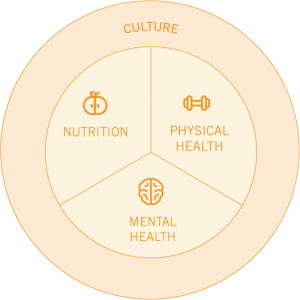Company culture determines how things are done and how people behave; it is the most difficult thing for competitors to copy. A passionate, engaged workforce with strong leadership will give a competitive advantage and contribute hugely towards business success; add health and well-being into the mix and you have, what I describe as the “Healthy Leaders way”. An organisation which is not only aware of the cultural ebbs and flows, but is also sensitive to the “whole person” – mental health; physical and nutritional needs. The question most often asked when I discuss the whole person is “does such an approach increase performance and productivity”; without hesitation, the answer is a resounding yes. If you do it properly – you cannot fail to improve performance.

Whether we like it or not, our environment has a profound influence on the things we think, feel and do. As Healthy Leaders of any type of organisation the focus is on maintaining positive mental health, supported by a physical lifestyle and the right nutrition for your needs; in order to make this happen it is imperative that you consider the environment or cultures that surround you.
If you consider the type of food that you eat; it is now understood that what you eat can determine your mood – many of you will have heard the expression hangry (being bad tempered due to being hungry). Basically, eating too many carbohydrates raises the sugar level in the body and plays havoc with the complex mass of hormones in your body, which in some people results in agitation. If you are agitated your mood will affect, not only how you think, but also what you do – the decisions that you make. At one level or another, the decisions you make shape your life! Making choices that influence your body, in a positive way seems to make complete sense; however if you have friends that want to go out and drink to excess or due to a challenging day at work you have a few drinks to “take the edge off”, you are not going to be at your best.
It is clear to see that the company you keep, and the habits you have could negatively impinge on your general wellbeing, because your activities “feel” normal. Or put another way; everybody else seems to be doing it and you don’t want to feel like the odd one out.
Over the past 40yrs as technology and manufacturing processes have become slicker and more cost-effective Western society has been producing labour saving devices, or as I refer to them, “life shortening devices”! The World Health Organisation have sited inactivity as a global issue – sedentary lifestyles are contributing to a variety of unsavoury health issues such as type2 diabetes; gout; cardiovascular disease and the list goes on. Many people do not have a structured physical activity programme; they don’t walk, they use the escalator rather than the stairs. The fact is, the less you do will result in you doing even less. And once the youthful stage of life has been passed, the dependency on pharmaceutical products to get you by eventually kicks in. In the UK alone 64million prescriptions were handed out for antidepressants in a year! Is there an alternative?
In the first instance, it would help to understand where you are; your general state of wellbeing. What is your current diet like and importantly it helps to actually ask, why do you eat the foods you eat? What is your current level of physical activity? How often do you raise your heartbeat beyond the adrenaline rush you may suffer sitting in traffic! What is your state of mind? Are you anxious; do you feel tense or stressed? If you take ownership of your food intake; by that I mean ensure that your decisions are actually your decisions and not dictated by marketing blurb on TV or some social media trend (who thought a high sugar, high caffeinated can of unpronounceable chemicals would actually make anyone feel good????); and if you organise some physical activity in your life as a routine part of being alive all for the purpose of your long-term wellbeing, you are on to a winner.
Working on your culture is only part of the story; if you have poor health, be that mental or physical it will undermine your performance and negatively impact on productivity. What are the influences in your life and do they contribute positively to your wellbeing; if the answer is, they don’t, what are you going to do about it? Choose to be a Healthy Leader.